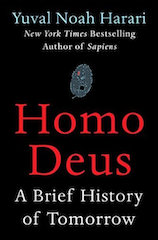This is the third of three posts featuring excerpts from the new book by Yuval Harari (Homo Deus: A Brief History of Tomorrow). The first post dealt with traditional religions, creeds and ‘isms.’ The second post, free will and consciousness. The excerpts below are some of Dr. Harari’s thoughts on new religions that might replace the old.
The obvious problem with posting selected excerpts the the absence of contest which you can only get by reading the book. I encourage you to do so.
The new religions are unlikely to emerge from the caves of Afghanistan or from the madrasas of the Middle East. Rather, they will emerge from research laboratories. […] Despite all the talk of radical Islam and Christian fundamentalism, the most interesting place in the world from a religious perspective is not the Islamic State or the Bible Belt, but Silicon Valley. That’s where hi-tech gurus are brewing for us brave new religions that have little to do with God, and everything to do with technology.
These new techno-religions can be divided into two main types: techno-humanism and data religion. Data religion argues that humans have completed their cosmic task and should now pass the torch on to entirely new kinds of entities. Techno-humanism still sees humans as the apex of creation and clings to many traditional humanist values […] but concludes we should use technology to create Homo deus — a much superior model. Homo deus will retain some essential human features, but will also enjoy upgraded physical and mental abilities that will enable it to hold its own even against the most sophisticated non-conscious algorithms. (With the help of genetic engineering, nanotechnology and brain-computer interfaces.
What might replace desires and experiences as the source of all meaning and authority? Information. The most interesting emerging religion is Dataism.
Data (has been) seen as only the first step in a long chain of intellectual activity. Humans were supposed to distil data into information, information into knowledge, and knowledge into wisdom. However, Dataists believe that humans can no longer cope with the immense flows of data.
Dataism is most firmly entrenched in its two mother disciplines: computer science and biology.
As data-processing conditions change again in the twenty-first century, democracy might decline and even disappear. As both volume and speed of data increase, venerable institutions like elections, political parties and parliaments might become obsolete — not because they are unethical, but because the can’t process data efficiently enough.
In the early twenty-first century politics is bereft of grand visions. Government has become mere administration. It manages the country, but no longer leads it. Government ensures that teachers are paid on time and sewage systems don’t overflow, but it has no idea where the country will be in twenty years.
We often imagine that democracy and the free market won because they were ‘good’. In truth, they won because they improved the global data-processing system.
Dataism is the first movement since 1789 that created a genuinely novel value: freedom of information.

